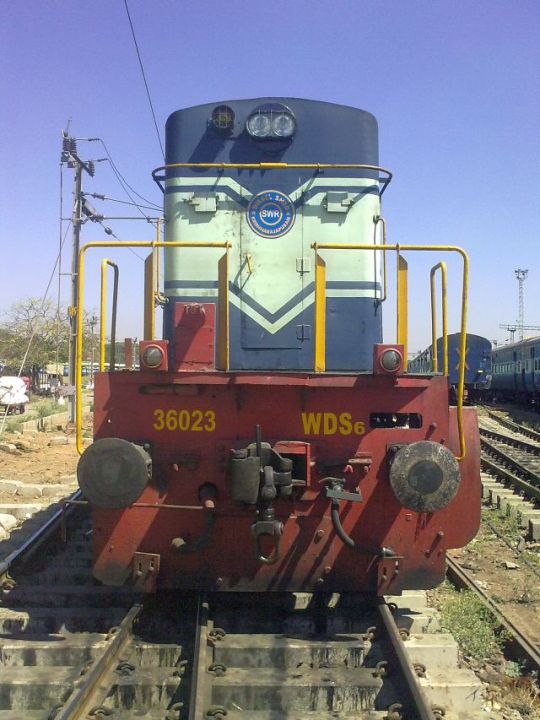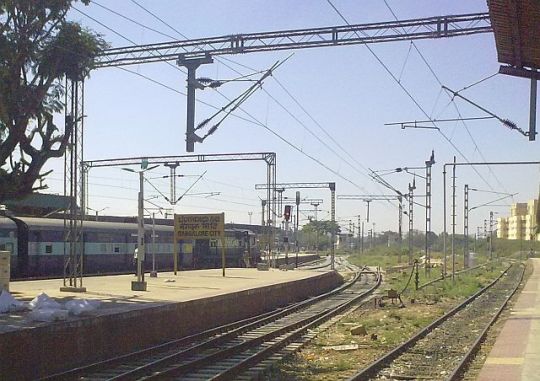HOT TOPICS
SPOTLIGHT AGENCIES
Indian Railways and the federal shackles - time for a break up
Written By silkboard - 14 January, 2013
Bangalore SWR Reforms Complaint Infrastructure Indian Railways federal
There are state highways, and national highways, who builds and maintains what is pretty clear. Viability analysis and rate of return on investment is not the top consinderation when state, such as Karnataka decides to upgrade a state highway, or just build a new road to connect a new district.

Central Government (through national highway act, 1956) and now NHAI (through NHAI Act, 1988) does the job of:
... development, maintenance and management of national highways and for matters connected therewith or incidental thereto ...
Then, you have Karnataka government (through Karnataka Highways Act, 1964) doing the job of:
—The State Government may, by notification in the official Gazette, declare any road, way or land to be a highway and classify it as,—
(i) a State highway (Special);
(ii) a State highway;
(iii) a major district road;
(iv) other district road; or
(v) a village road.
and
The State Government may ... appoint ... any person or any authority to be a Highway Authority for all highways in the State or in parts of the State, or for any particular highway or highways in the State ...
Contrast this with Indian Railways, and its geographically arranged, and seemingly administrative purpose only sub-parts like South Western Railway. There is no "mapping" of SWR to Karnataka, or any other state for that matter. There is no autonomy of decision making either with SWR, or state of Karnataka or both of them together.
- What benefit do we get by waiting on Central Railway Minister's speech to get a completely in-state train like Kolar Karwar Express or Chamrajnagar Bijapur express?
- When the central government takes on the additional burden of decision making by propagating even the local rail transportation needs all the way back to itself, we get neither efficiency nor speed.
- A local politician at Karnataka just can NOT make things like a Hubli-Bangalore high speed rail corridor his main election plank. This line of promise-making is plain and simple closed for us.
- Why can two states, say state of Karnataka and Tamilnadu not join hands to develop a faster rail corridor between Bangalore and Chennai, and execute the project with no decision making dependency on the central government?

Rail, Road and Air are the three main modes for connectivity infrastructure. Air not being as practical for spread (cost), rail and road are key. In here, state has the authority to develop and manage only one - "Decade long delay in double line between Bangalore and Mysore, okay, we will do our own 4 lane highway!"
To keep the inter state connectivity hassle free and smooth, designated tracks could be owned by a central entity. Or "slots" on marked and designated lines connecting state capital with each other could be handed over to a central authority to plan and operate longer distance cross-state goods and people movements.
But one doesn't see much merit in the Indian Railways staying the way it is today. It can be argued that it is hurting public interest now, poor people (and small businesses - for moving goods) are being denied the cheaper (in most cases) and faster connectivity (that rails offer) and are instead being lured towards fossil fuel based and more expensive (air, private vehicles) options.
It would seem that a central authority is required only to
- Issue and certify technology and safety standards
- Safeguard cross-state and through-state corridors in the national interests (so that in-state legislations, say at MP don't impact connectivity of states beyond it, say Karnataka and Northern states)
- Offer consultancy in designing and executing projects, as Indian Railways has built that expertise over the years
- Regulate fares to keep the option of control in case few states decide to outsource operations to third/private parties, and they go berserk on fares
Let the states decide for themselves where and where not lay tracks, and what to do with and on those tracks. Its time, and it could be hurting public interest as we see here today ourselves through delays and decision making unclarity on Commuter Rail Service and ever-pending simple-sounding projects like Mysore track doubling or a straight line to Hassan.
I am posting this to check around on the sentiments on this thought. This thread originated after our recent discussions on whether and when to pursue that PIL for Namma Railu. A PIL to ask for dissolution of bodies like SWR and replace them with autnomous state government controlled bodies - that would be attacking the very reason we have to live with unclarity on who to go plead with for Namma Railu :)
PS: Thoughts are mainly from passenger angle, I don't understand the commercial/goods side well enough.
PPS: Railway map of Karnataka, courtesy SBC_YPR, he sketched this here a few years ago. And not much has changed in the two years ;)
[flickr-photo:id=3294054885,size=o]
COMMENTS

Reforms - have been talked on and off
silkboard - 14 January, 2013 - 14:37
Railway reforms have been talked about, on and off. Main stream media brings the subject up only after accidents, with shallow coverage as usual.
English language business newspapers have a one track way of describing reforms. Corporatize, or privatize. That is a separate debate, to me, getting away from the federal structure comes first. then let the state (or a set of states together) do whatever they want with cast iron and rails.
Indian Express: Reforms railways the china way
Guardian (UK) : Break up railways to boost safety (but focus is privatisation)
ET: Time to reform (one of those reactive articles after an accident)

Dsimantle the current Zone System
kbsyed61 - 14 January, 2013 - 16:31
SB,
You are bang on. Central Government has little incentive to plan for development at local levels. One biggest reform that should happen in Railways is dismantle this zone systems that has not worked the way it should. Every state should be allowed to plan their own Railway network and services like other central departments do - Telecom, Postal etc. Though they are central departments but have the state imprints.
We did had this conversation on Praja.
http://praja.in/en/blog/kbsyed61/2009/02/16/karnataka-and-railways-game-praja-initiative
http://praja.in/en/gyan/railways-karnataka-game-vision-plan
Based on this conversation, we even had given these inputs in the form of high level vision plan to a known politician.
A Vision Plan for Railways in Karnataka.
It is time this discussion is refined and a detailed vision plan is brought out. This time we should go further with much more debate and discussion in public forums other than social media.

n - 15 January, 2013 - 00:34
"They" know - refer safety report pages 18-23 for recommendations. Although, the 5-year plan recommendations (also discussed here) do not mention it.
It may be worth a try to recommend to the high powered committee though their TOR does not include re-structuring.

national corridors, and the rest
silkboard - 15 January, 2013 - 01:55
thanks KBS and N for your comments.
A national highway like "national corridors" concept could cover two things
- Special status for capital-capital connectivity or national interest lines (say, for critical goods or troop movement)
- Smaller states who may not want the 'hassle' of operating their own railway lines, can opt to give away all the lines in their state as "national corridors" (ex: small north easter states)
Inter state routes can be managed the same way various zonal railways manage trains that travel betweeen and across the. This would require some regulation (from safety angle - don't cram too many trains, from revenue sharing angle - formula for participating states to share revenues or costs).
Once Karnataka Railways is in place (Ramesh and IDS had talked of this in Namma Railu context), we can all think of a solid and well connected Bus-Train system to interconnect most districts. Right now, you can't. And any demand for this or that on railway front easy deal for politicians and even administrators. center blame state, and vice versa.

K-RIDE - Current Status & Future Role
yantraka - 21 January, 2013 - 10:38
Managed to find the Annual Report (2011-2012) for K-RIDE -
http://www.hmrdc.com/wp-content/uploads/2012/07/K-RIDE.pptx
It exists, but seems to be at loggerheads with Ministry Of Railways (see the last slide).
PRAJA.IN COMMENT GUIDELINES
Posting Guidelines apply for comments as well. No foul language, hate mongering or personal attacks. If criticizing third person or an authority, you must be fact based, as constructive as possible, and use gentle words. Avoid going off-topic no matter how nice your comment is. Moderators reserve the right to either edit or simply delete comments that don't meet these guidelines. If you are nice enough to realize you violated the guidelines, please save Moderators some time by editing and fixing yourself. Thanks!





